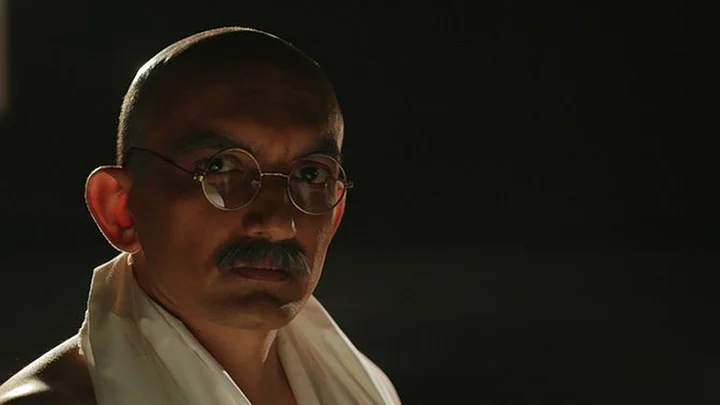Danesh Khambata’s experimental Gandhi: The Musical recently concluded its opening act in Mumbai after its release on Independence Day. Produced by the National Centre for Performing Arts with a mind-boggling budget of Rs 1 crore, the show with its impressive sets, elaborate costumes, and varied choreography is much like Gowarikar’s latest tryst with artistic freedom, Mohenjo Daro, in that both don’t seem very concerned about attention to historical details and nuances.
Oversimplifying the Life of a Mahatma: The Musical
Apart from thousands of letters, essays, speeches and book-related literature written by Mahatma Gandhi himself, each year several books, documentaries, and findings are added to the wealth of knowledge available of Gandhi: the man, the husband, the father, the lawyer and the leader.
And yet, the musical is the story of Mahatma Gandhi straight out of middle school CBSE textbooks. Khambata’s “extensive research” led him to lay out the most oversimplified and clichéd instances from Gandhi’s life: Gandhi facing racism in South Africa leading to his political and social awakening; the Jallianwala Bagh massacre; Gandhi’s campaign to rename Untouchables as ‘Harijans’; protesters setting fire to a police station in Chauri Chaura for which Gandhi was sent to jail; the Quit India movement followed by the Dandi March; and finally gaining independence and Gandhi’s assassination.
The life story of Gandhi has been done to death in movies, books, theatre, and documentaries. Khambata had the chance to explore some lesser-known facets of Gandhi’s life or spin a new angle such as his psychological journey from Gandhi to Mahatma or Gandhi’s complicated relationship with religion and God. Yet, what we see on stage are the same selected anecdotes from Mahatma’s life, deemed fit for national and international regurgitation for decades now.
Gandhi: A Tenor in a Top Hat?
Gandhi and vigorous jazz hands don’t usually go together and in the case of such odd pairings, it is best to trust the diktat. While credit is due to Khambata for taking the risk of experimenting with possibly one of the most ambitious styles of theatre, its failed attempt must be called out. The three-hour saga of unnecessary song and dance does little to add to or further the narrative, often pairing jarring dance forms with events that require solemnity. Music composer duo, Rahul Pais and Nariman Khambata, do their best by the story, peaking in skill during slower, emotional songs. However, director Khambata’s consistently infantile lyrics across the play quash any chances of redemption.
In a courtroom scene, a Zulu man (Rohit Tiwari) with a borderline-racist accent is shown being tried for non-payment of taxes. Suddenly, and without any warning, the cast breaks into a spontaneous jazz routine: the lawyers shed their robes for bedazzled black and red costumes; the prosecutor (Harssh A Singh) appears in a jester’s costume; and, the British judge with a curious tinge of American in his accent (Francois Castellino), now dons a tailcoat and a top hat. They dance around to jumpy piano chords around young Gandhi as he comes to term with the reality of institutionalised racism in the country. Gandhi’s welcome into South Africa is portrayed by a culturally appropriated ill-informed attempt at the ancient African Zulu dance; the cliché extends when a full-scale Bollywood extravaganza is staged to depict Gandhi’s return to India.
Spoiler Alert: Boman Irani Makes It Worse
You know a play has failed when theatre stalwart Boman Irani not only can’t redeem it, but, really, makes it worse. You’d think that Irani would lend the narrative voice of the Raj an imposing, intimidating and insulting tenor. But each time his voice was played, the visual of a face shrouded in a British flag would accompany it against a blacked-out stage, making Irani sound more caricaturish than intense, like an evil ghoul in a school in an episode of Scooby Doo.
Abhishek Krishnan does a fair job of executing the infantilised script by completely overlooking the dilemmas that plagued Gandhi through his journey and instead, portraying him as a smiling, bumbling idiot. In a scene soon after Gandhi brings his family to South Africa, Kasturba is shown waiting, to a longing melody, for Gandhi. Soon, he arrives and a cheerful family reunion is underway. The preceding sequence of events is, however, grim: on their voyage to South Africa, Gandhi is accused of shipping the indentured labourers on his ship into the country and is held in quarantine for 23 days with his family on the ship. After landing, he sends his family away to a stranger Parsi client of his in the city; while trying to leave the ship, he is brutally beaten by a mob of ‘whites’ and is carried to the Parsi’s house, bleeding and injured. For Gandhi to be so cheery in the midst of soul-crushing humiliation and his ever-so-crucial political and social awakening is simply unbelievable – and not in a good way.
The only saving grace of the musical is the graceful performance of Chirag Vohra as Gandhi in his older years. It is a juvenile, poorly-researched and incongruous song-and-dance extravaganza on Gandhi’s life, propped up on shallow, emotional patriotism which hits a crescendo when a quivering Vohra sings the national anthem in front of the Indian flag towards the end of the play. And, just like that, the audience is sold.
